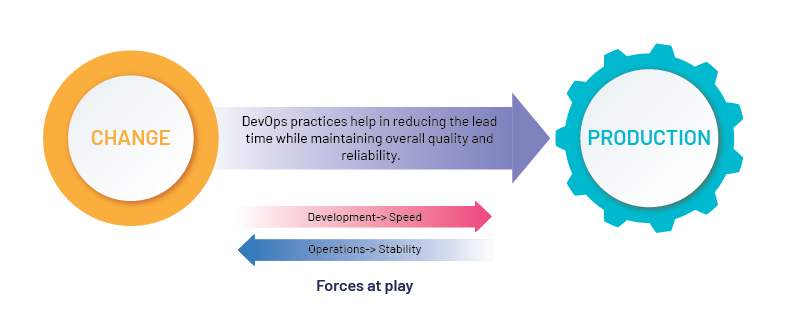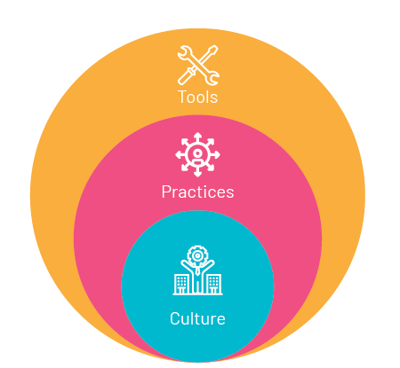The Digital Revolution has put every business under threat. Businesses are either already disrupted, being challenged, or will be challenged in the future. Companies like Yahoo, Nokia, GM, and Sony have had successful business models, but failed to re-invent themselves. Whereas companies such as Amazon, Apple, Uber, and Tesla have disrupted the market in a relatively short time. Strong businesses struggle to thrive and eventually surrender to the never-ending challenges arising as the result of digital disruption.
So, is having a sound business strategy, some smart people, and cutting-edge technologies enough?
Today, the business of business is to quickly adapt to the changing environment. The impetus for change can come from many sources, including business strategy, customer research, operations, analytics, competition analysis, innovation, etc. The key is to experiment, “fail fast” to quickly eliminate changes not worth pursuing at the same time expedite implementation of changes that are the most valuable.
 Ability to rapidly implement change(s) is the key to success
Ability to rapidly implement change(s) is the key to success
In today's digitized times, it's hard to find an enterprise which isn’t leveraging (or on the journey to) agile and DevOps practices to accelerate the pace of change and digital transformation. Despite that, they don't achieve the desired business benefit. One of the most critical but often overlooked aspects is people and culture. People are an indispensable resource in an organization. To harness the full potential of people and teams, their values and goals must be aligned to the enterprise vision as well as the company culture.

Culture is the foundation stone
The enterprise leadership must focus on evolving the company's culture to embrace the DevOps and agile ways of working—including changing its ways of working.
The key to success is how quickly can you transform the culture of the organization to really work as a unified team to achieve a collective goal. It’s about working together to discover the quickest ways of making changes in the production without compromising on the quality.
The DevOps culture must promote traits like risk-taking, empowerment, ownership, persistence, transparency, open communication, and agility. Great work gets done when people in an organization are empowered, motivated, and aligned towards a shared objective.
As Peter Drucker says, “Culture eats strategy for breakfast."
What are the cultural traits for DevOps to succeed?
Following are a few cultural traits seen in high-performing teams:
- Ensuring open communication and collaboration within and across teams
- Assuring complete transparency between people (including the leadership)
- Providing the right environment to people where they feel comfortable about sharing their goals, progress (including successes and failures)
- Aligning all roles with their respective business outcomes. When people are not aligned to shared goals, they pursue their own goals
- Respect and trust among individuals
- Having a sense of urgency and taking pride in the work
- Ensuring effective decision making
- Having a right risk-taking appetite
- Taking full ownership of work

Culture + Vision = Desired business outcomes
An approach to cultural change
Culture change is easier said than done—especially if you are a large enterprise with years of legacy and hierarchy. Top down, heavy-handed approach rarely works. To get started with a DevOps cultural transformation, your organization must have:
- Effective Sponsorship: Ensure that cultural change becomes your CEO’s priority.
- Defined desired behaviors: Align your strategy with processes (identify tangible benefits, e.g., cycle time improvement, defects not leaked out during production, a forum to learn from failures, etc.) Culture change follows behavior change. Behavioral change can be triggered by focusing on specific areas and practicing the new way of working.
- Cultural evangelists: Start small. Identify a small group of people who have the potential to become your evangelists.
- Transparent communication: The people must understand WHY the changes are important, not just WHAT the changes are.
- Effective tools: Use effective tools that facilitate better collaboration, transparency, and teamwork. Tools like Confluence, Trello, Jira, etc., can help bring teams together.
- Organizational awareness and recognition: Showcase and celebrate the success of your team.
An effective business strategy, the brightest minds and an impressive technology stack will only be useful when the strategic vision of the company aligns with an evolved DevOps and agile culture. With this synergy, an organization can derive the desired business outcomes and forge a successful digital transformation journey. Thus, start out small, create visibility, celebrate success, and eventually scale in different areas within the enterprise.





